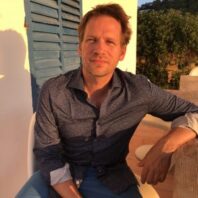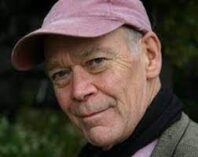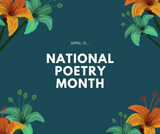HE HADN’T PREPARED me for the house, for how wildly inappropriate a dwelling it was for a man who was in a wheel-chair. Stacked like a tea-tray of sandwiches on a sopping wet hill in Queen Anne, it climbed higgledy-piggledy into a thicket of conifers, and somewhere, up there, among the shaggy, dripping green, was one of the best writers of geography to have ever lived in North America, Jonathan Raban.
For the past dozen years he hadn’t left the house much, and for the past few hardly at all. A massive hemiplegic stroke had greeted Jonathan just shy of his 69th birthday, and put him into a chair, leaving the partial use of one hand. When I made my way, as instructed, into his house, through his study, up the stairs, I found him using his one good hand to direct his daughter, Julia, in the proper stir rate of a curry he was making me for dinner. A wettish cigar lingered in it.
Most writers, upon meeting their new editor, like gifts, others flattery, a dinner out. Raban had neatly inverted all of this. While some of this courtship would have been impossible anyway – Jonathan later told me to leave the house he had to take a special ambulance which cost $1,000 a ride – I was still embarrassed by my surprise. Of course a man who spent most of his life traveling, meeting strangers, sometimes crossing paths at sea, would understand the meaning of hospitality.
While the curry bubbled, Jonathan encouraged me to the window, where waxwings sometimes visited, and with views toward Fremont and Ballard. On a rainy day like today, however, all was covered in shroud and the house, made of Douglas Fir in 1906, had the snug, dry feel of a boat in inclement weather. Indeed, I later learned it had been made by a boatmaker, Mike Wollaston.
Seeing the home of a writer you admire is almost always overwhelming. Tiny details zoom forward. Why, I recall thinking, after a day among the sun-blasted splendor of Halldor Laxness’ river-perched home in Iceland, did he have so many dolls? I once spent an afternoon with Tomas Transtromer, another stroke victim, at his family’s summer cottage on an island in Sweden, listening to the wind rustle the trees I had read about in his great poems.
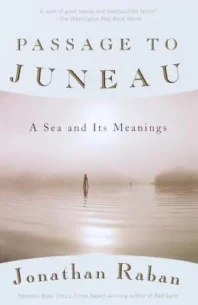 Raban’s house was different from any I had encountered. There were a few framed awards and reviews, but the overwhelming impression was of a place whose views were equally outward and inward facing – not unlike Raban’s books. BAD LAND and PASSAGE TO JUNEAU and his great account of sailing down the Mississippi OLD GLORY are all interior journeys as well as physical ones: chronicles of shifting frontiers.
Raban’s house was different from any I had encountered. There were a few framed awards and reviews, but the overwhelming impression was of a place whose views were equally outward and inward facing – not unlike Raban’s books. BAD LAND and PASSAGE TO JUNEAU and his great account of sailing down the Mississippi OLD GLORY are all interior journeys as well as physical ones: chronicles of shifting frontiers.
Nations all contain borderlands, and Jonathan loved moving around in them – not just the boundary between the coast and the sea, but between suburbs and forest, between their pasts and present. Between what they profess to be and what they are. He was a genius at inhabiting these spaces. PASSAGE TO JUNEAU might be his best, for the way it retells Vancouver’s journey up the Inner Passage, naming a staggering number of the Pacific Northwest’s waterways, mountains, cities and towns, layering it with what Raban has learned of indigenous tribes who lived all along the passage.
In each book, Jonathan had swatted up, as the British say, to an extraordinary degree on new topics, places, and people. But he wore his knowledge lightly, and indeed had always been approachable (as an editor). This was the word on the street. And indeed it was true. I had earned this invitation to be his new editor because I’d written him a letter a dozen years back when I was editing Granta magazine. We were assembling an upcoming issue and I’d written to ask if he had anything on the go. His response came back so fast it was hard to believe its content: he had suddenly and irrevocably been rendered an old man by a stroke, and he was so wrapped up in the business of writing about it that he couldn’t do anything new, he was sorry.
And so, twelve years later, after his latest editor – the great and decent Dan Frank – died, I came to meet Jonathan. He was deep into this new territory, many hundreds of thousands of words into it, in fact, of making sense of life after the stroke, but also of what he had inherited from his father, who had undertaken a remarkable and traumatic journey into unknown territory – the war – some 70 years before Jonathan had driven himself to the hospital on a June morning because he was feeling unwell. In the telling, they are two men, arrowing home.
That night, we began to get to know one another. I mostly listened as Jonathan explained his purpose for the book. It was not to be cloven in two, a stroke book and a father book, but to proceed as a double-helix tale about the two men, orbiting in similar motions but years apart, not to connect. We agreed the manuscript he had written to that point was too long, and that it was clearly two books, and so we set out to find a place to cut it and begin shaping the first part for publication.
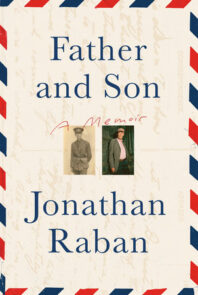 That act created FATHER AND SON. Very little of what became the book was not already there. His gorgeous sentences, his wry dignity, his self-deprecating humor about being a bad patient, the immensities of his reading about World War II, which animate the sections about his father’s incredible survival of being sunk at Dunkirk, only to later wind up in Palestine, at Anzio, forever trying to get home. All of that was in place, and the amount of research Jonathan had done about life back home in England and what his mother had experienced, waiting, what she had written to his father, away in a trench, it was astounding. How in the world, I wondered, had a man with essentially one useable finger kept track of all this research?
That act created FATHER AND SON. Very little of what became the book was not already there. His gorgeous sentences, his wry dignity, his self-deprecating humor about being a bad patient, the immensities of his reading about World War II, which animate the sections about his father’s incredible survival of being sunk at Dunkirk, only to later wind up in Palestine, at Anzio, forever trying to get home. All of that was in place, and the amount of research Jonathan had done about life back home in England and what his mother had experienced, waiting, what she had written to his father, away in a trench, it was astounding. How in the world, I wondered, had a man with essentially one useable finger kept track of all this research?
Much of it he’d stored in his head. I came back to Seattle four months later for a week to go over the final manuscript and in threaded and rethreading the sections I found Jonathan not only could recall many of the facts of what he researched, he seemed to know the entirety of his book by heart. For a week we sat in the disheveled splendor of his downstairs study and read the book aloud to one another, making sure nothing was repeated. He had a beautiful speaking voice, it was hardly a chore.
Each day Jonathan insisted we break for lunch, during which we’d discuss books, literary gossip (he was worried over his friend Salman Rushdie, who’d just then been assaulted on stage), the world, Trump (I fear he’s going to win, Jonathan said, which haunts me, he has rarely been wrong on politics), and a startling array of people and places. One of the last books he had read back then was Sarah Smarsh’s chronicle of growing up a fifth generation Kansas farm girl, what it meant to be from a family which made itself by that kind of labor.
If you love a book, as an editor, it’s hard not to fall in love with the writer’s effort. Taking that to account, Jonathan’s effort to finish FATHER AND SON was unlike anything I had ever seen. His stamina was simply awesome, and when it came time to get the book into copyediting I wondered, privately, how little work he’d left anyone to do. As it turned out, that was his last gift. He fell ill and died before he could go over the copyedits, always a writer’s final thrashing in the weeds. It was no matter, like everything Jonathan made, its lines were true, its balance perfect. FATHER AND SON was built for the ages.
John Freeman is an executive editor at Alfred A. Knopf.
